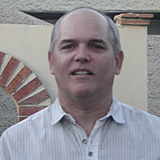 |
 |
 |
 Editorials | October 2007 Editorials | October 2007  
Madrazo - Mexico's Marathon Man
 Allan Wall - PVNN Allan Wall - PVNN


| | Mexican former presidential candidate Roberto Madrazo celebrates as he crosses the finish line during the 2007 Real Berlin Marathon in Berlin, Sunday, Sept. 30, 2007. (AP/Victor Sailer) |
"The Fastest Man of Mexico." That's what Germany's "Berliner Zeitung" newspaper mockingly called Roberto Madrazo, the 55-year old Mexican politician who recently won - and is being disqualified from - a marathon in Berlin, Germany.

Madrazo is not just any Mexican politician. A career politician in the PRI (Institutional Revoluationary Party,) he has been a congressman, senator, governor of Tabasco state andchairman of the PRI. In 2006, Madrazo was the PRI presidential candidate, finishing third in the race.

Madrazo doesn't exactly have a clean political reputation. In his campaign for governor of Tabaso he vastly overspent legal campaign limits, and during the investigation apparently faked his own kidnapping.

Madrazo is also an experienced runner who ran a 3:37 in the San Diego Marathon.

But in the September 30th Berlin Marathon, Madrazo placed first in the 55-59 age category, with a time of 2 hours, 41 minutes and 12 seconds!

It was the #146th fastest time out of over 40,000 runners at Berlin, and it shaved almost an hour off his previous time.

A little too impressive and suspicious for several reasons.

For one thing, Marathon Man crossed the finish line still wearing a windbreaker and long pants, and not sweating very much. Other runners had long ago shed their extra clothing and were sweating profusely.

The anomalies of Madrazo's victory piqued the curiousity of photographer Victor Sailer, and back home in Mexico the Reforma newspaper. After some investigative work, the Berlin Marathon authorities announced on October 8th that Madrazo would be disqualified as the winner in his category. The real winner was Martin Wahl, a German.

The marathon is a prestigious race with an ancient origin.

In the battle of Marathon in 490 B.C., the Greeks defeated the Persians (that was 10 years before the battle of Thermopylae, portrayed in the recent 300 movie.) A Greek ran from Marathon to Athens to announce the victory, then dropped dead of exhaustion.

There are two routes from the town of Marathon and Athens - one 21.4 miles and the other 25.3 miles.The first modern Olympics (Athens, 1896) used the longer route.

The race's current length of 26 miles, 385 yards (42.195 kilometers) was established in the London Olympics of 1908, so the royal family could match the start of the race from the Windsor castle balcony and view the end in the Royal Box of the Olympic Stadium.

Madrazo's "triumph" was not the first irregularity in the history of the sport. In the 1904 (St. Louis) Olympics, American runner Frederick Lorz rode in an automobile for nearly half the race, and "won", until the truth came out.

The Berlin Marathon utilizes a verification system with chips placed on runner's shoes, which are scanner and recorded by electronic scanners situated alonside the route.

These scanners don't indicate that Madrazo passed checkpoints from the 20th to the 35th kilometers, which is quite a gap. Suspiciously, at the 20 kilometer mark there is a shortcut that would take a runner to the last few kilometers of the race.

Suppposing, just for the sake of argument, that Madrazo ran the whole lenghth of the race, then he'd have to have covered the 15 kilometers (from kilometer 20 to kilometer 35) in 21 minutes, whereas the world record for that distance is 41 minutes!

In other words, it looks a lot like Roberto Madrazo cheated in the marathon.

Each year, about 40 runners (out of about 40,000) are disqualified in the Berlin Marathon. But Madrazo is a famous politician from a country that already has a repuation for political corruption. Unsurprisingly, the German media had some fun with this one.

Madrazo's spokeswoman Addy Garcia defended her boss, responding that "At this moment he holds no public office, and he is just like any other Mexican who doesn't have to give an explanation to anyone."

Later, Madrazo's "explanation" was circulated on the Internet, addressed to the "Mexican Sports Community."

Quoth Madrazo, "I had to stop at Kilometer 21 and I went directly to the finish line for my clothes and my medal of participation, the same one given to all runners without exception."

If that were true why did Madrazo cross the finish line, ham it up for the camera, and accept his victory?

Frederick Lorz also made the "picking up my clothes" excuse in 1904.

Ironically, Madrazo's email also announced the establishment of his new foundation, called "Marathon."

What was this guy thinking?
 Allan Wall is an American citizen who has been teaching English in Mexico since 1991, and writing articles about various aspects of Mexico and Mexican society for the past decade. Some of these articles are about Mexico's political scene, history and culture, tourism, and Mexican emigration as viewed from south of the border, which you can read on his website at AllanWall.net. Allan Wall is an American citizen who has been teaching English in Mexico since 1991, and writing articles about various aspects of Mexico and Mexican society for the past decade. Some of these articles are about Mexico's political scene, history and culture, tourism, and Mexican emigration as viewed from south of the border, which you can read on his website at AllanWall.net.

Click HERE for more articles by Allan Wall. | 
 | |
 |



